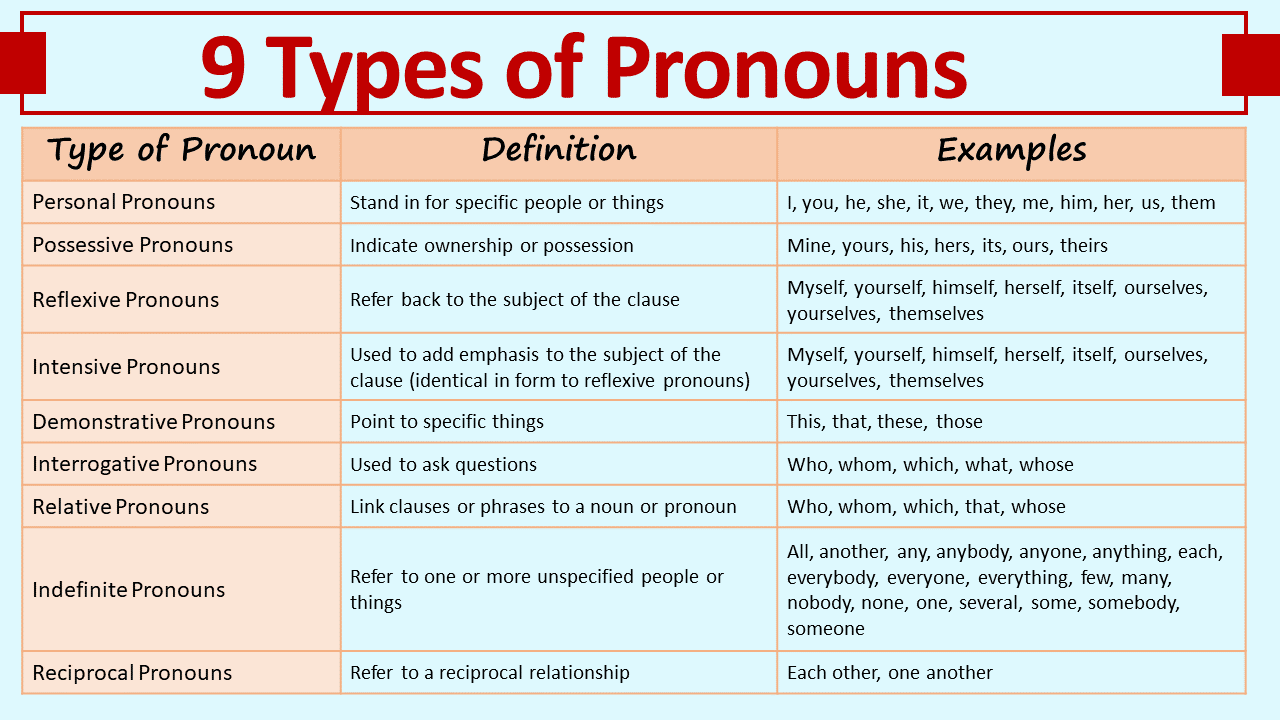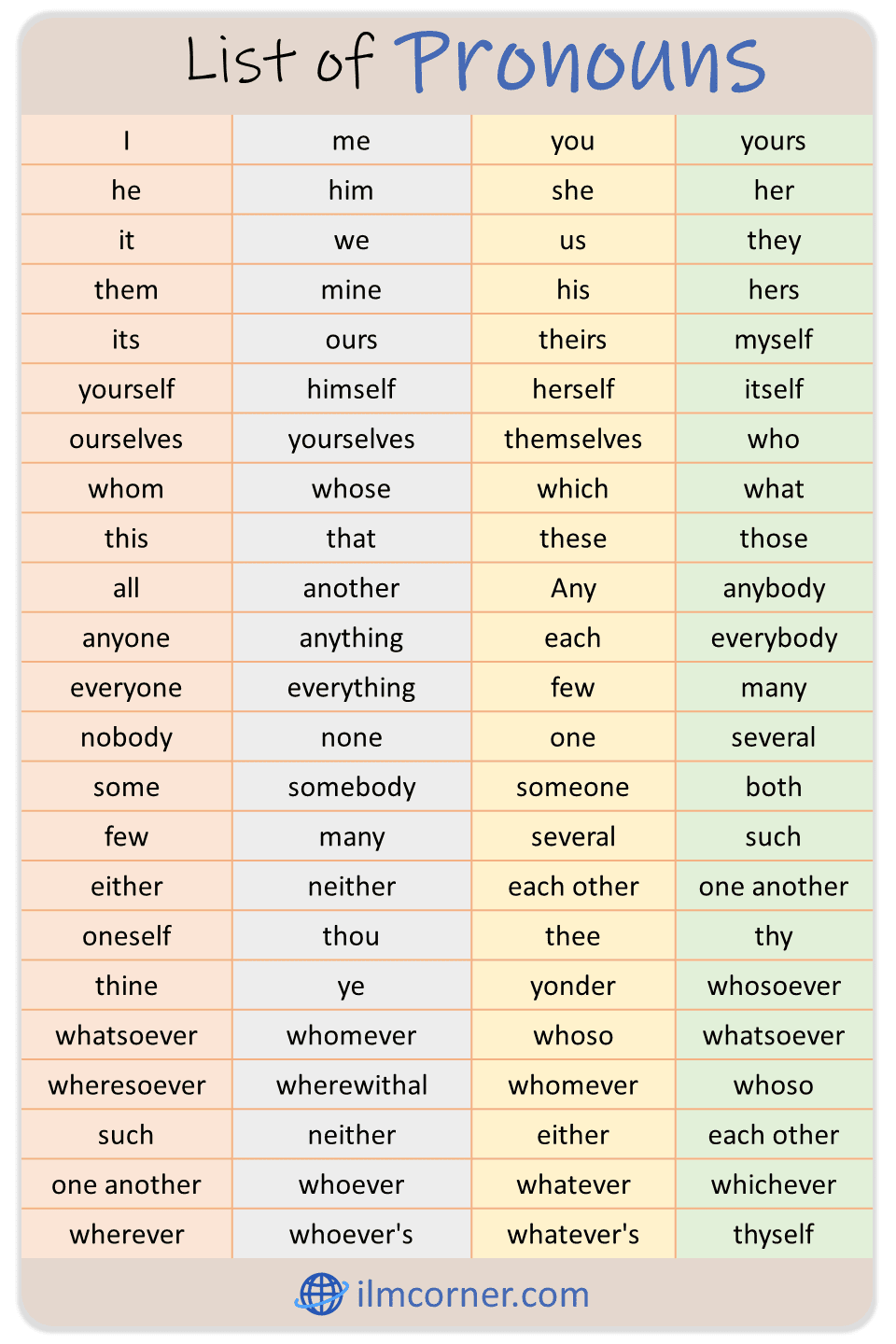Pronouns are an essential component of English grammar. They are words that we use as substitutes or replacements for nouns and noun phrases. The word or phrase that a pronoun replaces or refers to is called its antecedent. By using pronouns, we can avoid repetitive and monotonous language, making our sentences more efficient and easier to understand.
For instance, instead of saying “John went to the park. John played football. John had a great time,” we can use pronouns to make the sequence of sentences more fluid and natural: “John went to the park. He played football. He had a great time.”
There are several types of pronouns, each serving different functions in a sentence. Here are some of the most common ones:
| Type of Pronoun | Definition | Examples |
|---|---|---|
| Personal Pronouns | Stand in for specific people or things | I, you, he, she, it, we, they, me, him, her, us, them |
| Possessive Pronouns | Indicate ownership or possession | Mine, yours, his, hers, its, ours, theirs |
| Reflexive Pronouns | Refer back to the subject of the clause | Myself, yourself, himself, herself, itself, ourselves, yourselves, themselves |
| Intensive Pronouns | Used to add emphasis to the subject of the clause (identical in form to reflexive pronouns) | Myself, yourself, himself, herself, itself, ourselves, yourselves, themselves |
| Demonstrative Pronouns | Point to specific things | This, that, these, those |
| Interrogative Pronouns | Used to ask questions | Who, whom, which, what, whose |
| Relative Pronouns | Link clauses or phrases to a noun or pronoun | Who, whom, which, that, whose |
| Indefinite Pronouns | Refer to one or more unspecified people or things | All, another, any, anybody, anyone, anything, each, everybody, everyone, everything, few, many, nobody, none, one, several, some, somebody, someone |
| Reciprocal Pronouns | Refer to a reciprocal relationship | Each other, one another |
A Paragraph and Give Analysis on Type of Pronoun
“John was feeling quite pleased with himself. He had managed to finish all his assignments before the deadline, which was a first for him. He thought to himself, ‘This is an achievement!’. He wanted to celebrate, so he called his friends and told them, ‘Let’s all go out for dinner. It’s my treat.’ Everyone was excited and agreed with him.”
Now, let’s analyze the types of pronouns used:
- “John was feeling quite pleased with himself.” – ‘Himself’ is a reflexive pronoun, which is used when the subject and the object of the sentence are the same person.
- “He had managed to finish all his assignments before the deadline, which was a first for him.” – ‘He’ and ‘him’ are personal pronouns. ‘He’ is a subject pronoun and ‘him’ is an object pronoun.
- “He thought to himself, ‘This is an achievement!’.” – ‘Himself’ is again a reflexive pronoun here.
- “He wanted to celebrate, so he called his friends and told them, ‘Let’s all go out for dinner. It’s my treat.'” – ‘Them’ is a personal pronoun used as an object.
- “‘Let’s all go out for dinner. It’s my treat.'” – ‘My’ is a possessive adjective (related to pronouns) showing that the treat belongs to the speaker.
- “Everyone was excited and agreed with him.” – ‘Everyone’ is an indefinite pronoun referring to all the people, and ‘him’ is a personal pronoun.
20 Sentences on Different Types of Pronouns
- Personal Pronoun (Subject): “She loves to read science fiction novels.”
- Personal Pronoun (Object): “I gave the book to him.”
- Possessive Pronoun: “The last piece of pizza is mine.”
- Reflexive Pronoun: “I saw myself in the mirror.”
- Intensive Pronoun: “I myself cooked this dinner.”
- Demonstrative Pronoun (Near): “This is my favorite book.”
- Demonstrative Pronoun (Far): “That was a fantastic movie.”
- Interrogative Pronoun: “Who is the author of this book?”
- Relative Pronoun: “The person who called you is my friend.”
- Indefinite Pronoun (Singular): “Someone left their bag in the classroom.”
- Indefinite Pronoun (Plural): “Several of the guests arrived late.”
- Reciprocal Pronoun: “They gave each other gifts on their anniversary.”
Now lets see some less common forms of personal pronouns:
- Personal Pronoun (Subject, 1st person plural): “We are planning to host a party.”
- Personal Pronoun (Object, 1st person plural): “The gift was a surprise for us.”
- Personal Pronoun (Subject, 2nd person): “You should try this new restaurant.”
- Personal Pronoun (Object, 2nd person): “I have a message for you.”
- Personal Pronoun (Subject, 3rd person plural): “They live in Canada.”
- Personal Pronoun (Object, 3rd person plural): “I invited them to the concert.”
- Possessive Pronoun (1st person plural): “The house is ours.”
- Possessive Pronoun (3rd person plural): “The choice is theirs.”
List of Pronoun Words in English
| I | me | you | yours |
| he | him | she | her |
| it | we | us | they |
| them | mine | his | hers |
| its | ours | theirs | myself |
| yourself | himself | herself | itself |
| ourselves | yourselves | themselves | who |
| whom | whose | which | what |
| this | that | these | those |
| all | another | Any | anybody |
| anyone | anything | each | everybody |
| everyone | everything | few | many |
| nobody | none | one | several |
| some | somebody | someone | both |
| few | many | several | such |
| either | neither | each other | one another |
| oneself | thou | thee | thy |
| thine | ye | yonder | whosoever |
| whatsoever | whomever | whoso | whatsoever |
| wheresoever | wherewithal | whomever | whoso |
| such | neither | either | each other |
| one another | whoever | whatever | whichever |
| wherever | whoever’s | whatever’s | thyself |


